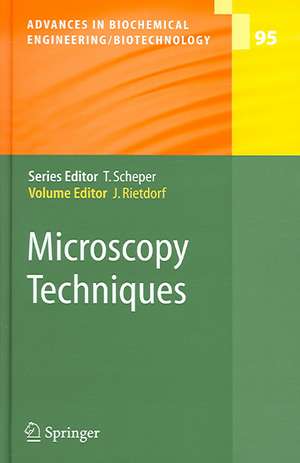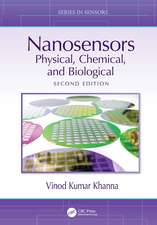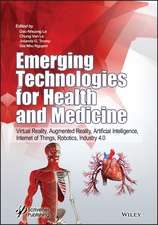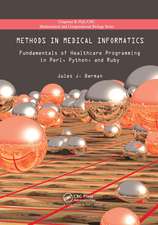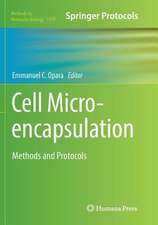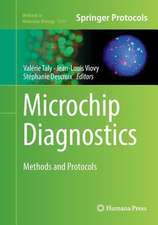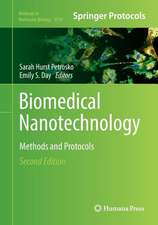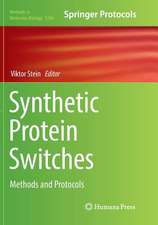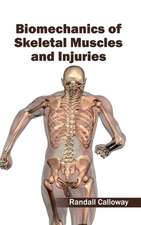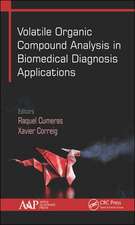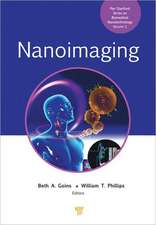Microscopy Techniques: Advances in Biochemical Engineering/Biotechnology, cartea 95
Editat de Jens Rietdorfen Limba Engleză Hardback – 23 iun 2005
| Toate formatele și edițiile | Preț | Express |
|---|---|---|
| Paperback (1) | 1543.79 lei 38-44 zile | |
| Springer Berlin, Heidelberg – 12 feb 2010 | 1543.79 lei 38-44 zile | |
| Hardback (1) | 1823.86 lei 6-8 săpt. | |
| Springer Berlin, Heidelberg – 23 iun 2005 | 1823.86 lei 6-8 săpt. |
Din seria Advances in Biochemical Engineering/Biotechnology
-
 Preț: 385.84 lei
Preț: 385.84 lei -
 Preț: 383.12 lei
Preț: 383.12 lei -
 Preț: 383.71 lei
Preț: 383.71 lei - 18%
 Preț: 1220.45 lei
Preț: 1220.45 lei - 18%
 Preț: 1816.43 lei
Preț: 1816.43 lei - 5%
 Preț: 1415.54 lei
Preț: 1415.54 lei - 5%
 Preț: 2113.74 lei
Preț: 2113.74 lei - 18%
 Preț: 1219.16 lei
Preț: 1219.16 lei - 18%
 Preț: 1823.56 lei
Preț: 1823.56 lei - 18%
 Preț: 1219.63 lei
Preț: 1219.63 lei - 18%
 Preț: 1224.18 lei
Preț: 1224.18 lei - 18%
 Preț: 1826.07 lei
Preț: 1826.07 lei - 18%
 Preț: 1836.31 lei
Preț: 1836.31 lei -
 Preț: 383.71 lei
Preț: 383.71 lei - 18%
 Preț: 1821.81 lei
Preț: 1821.81 lei - 18%
 Preț: 1822.57 lei
Preț: 1822.57 lei - 18%
 Preț: 2477.79 lei
Preț: 2477.79 lei - 18%
 Preț: 1817.08 lei
Preț: 1817.08 lei - 18%
 Preț: 2467.38 lei
Preț: 2467.38 lei - 18%
 Preț: 2085.39 lei
Preț: 2085.39 lei - 18%
 Preț: 2082.40 lei
Preț: 2082.40 lei - 18%
 Preț: 1212.84 lei
Preț: 1212.84 lei - 18%
 Preț: 1213.65 lei
Preț: 1213.65 lei - 18%
 Preț: 1815.49 lei
Preț: 1815.49 lei -
 Preț: 388.72 lei
Preț: 388.72 lei - 18%
 Preț: 1814.73 lei
Preț: 1814.73 lei - 18%
 Preț: 939.46 lei
Preț: 939.46 lei - 18%
 Preț: 1820.22 lei
Preț: 1820.22 lei
Preț: 1823.86 lei
Preț vechi: 2224.23 lei
-18% Nou
Puncte Express: 2736
Preț estimativ în valută:
349.04€ • 360.58$ • 290.49£
349.04€ • 360.58$ • 290.49£
Carte tipărită la comandă
Livrare economică 25 martie-08 aprilie
Preluare comenzi: 021 569.72.76
Specificații
ISBN-13: 9783540236986
ISBN-10: 3540236988
Pagini: 336
Ilustrații: XII, 320 p. 85 illus., 19 illus. in color.
Dimensiuni: 155 x 235 x 26 mm
Greutate: 0.65 kg
Ediția:2005
Editura: Springer Berlin, Heidelberg
Colecția Springer
Seria Advances in Biochemical Engineering/Biotechnology
Locul publicării:Berlin, Heidelberg, Germany
ISBN-10: 3540236988
Pagini: 336
Ilustrații: XII, 320 p. 85 illus., 19 illus. in color.
Dimensiuni: 155 x 235 x 26 mm
Greutate: 0.65 kg
Ediția:2005
Editura: Springer Berlin, Heidelberg
Colecția Springer
Seria Advances in Biochemical Engineering/Biotechnology
Locul publicării:Berlin, Heidelberg, Germany
Public țintă
ResearchCuprins
Miyawaki, T. Nagai, H. Mizuno: Engineering Fluorescent Proteins.- C.-K. Sun: Higher Harmonic Generation Microscopy.- R. Gräf, J. Rietdorf, T. Zimmermann: Live Cell Spinning Disk Microscopy.- T. Wazawa, M. Ueda: Total Internal Reflection Fluorescence Microscopy in Single Molecule Nanobioscience.- T. Kohl, P. Schwille: Fluorescence Correlation Spectroscopy with Autofluorescent Proteins.- E.B. van Munster, T.W.J. Gadella: Fluorescence Lifetime Imaging Microscopy.- A.B. Houtsmuller: Fluorescence Recovery After Photobleaching: Application to Nuclear Proteins.- J.-B. Sibarita: Deconvolution Microscopy.- T. Zimmermann: Spectral Imaging and Linear Unmixing in Light Microscopy.- K. Miura: Tracking Movement in Cell Biology.-
Recenzii
From the reviews:
"Light Microscopy has returned to fashion through the synergy of green fluorescent protein and a clutch of techniques involving some permutation of lasers, mathematics and acronyms, which offer the prospect of watching biological molecules at work inside living cells. This volume provides an introduction to these techniques … . this volume will be a longer-term reference for anyone who wants to understand how these methods actually work. In this respect it is excellent." (John Armstrong, Microbiology Today, July, 2006)
"Advances in microscopy techniques have recently had a tremendous impact on research in biochemistry and molecular biology. While the study of biochemical reactions was formerly confined to cuvette-based measurements of purified biomolecules, it is now possible for investigators to make such analyses inside the complex environment of living cells and organisms.
While some of these advanced techniques were in fact developed some time ago, it is only now that they are becoming available to a wider range of researchers as components of commercial equipment. As a consequence, there is a strong demand for the ability to help individuals from a biomedical, rather than from an instrumental background, in order for them to make the best use of these tools in their research. To meet these requirements, the contributions in this book mainly stem from instructors present at a series of very successful training courses held in the Advanced Light Microscopy Facility at the European Molecular Biology Laboratory over the past 5 years." (P.W. Hawkes, Ultramicroscopy, Issue 107, p. 52, 2007)
"Light Microscopy has returned to fashion through the synergy of green fluorescent protein and a clutch of techniques involving some permutation of lasers, mathematics and acronyms, which offer the prospect of watching biological molecules at work inside living cells. This volume provides an introduction to these techniques … . this volume will be a longer-term reference for anyone who wants to understand how these methods actually work. In this respect it is excellent." (John Armstrong, Microbiology Today, July, 2006)
"Advances in microscopy techniques have recently had a tremendous impact on research in biochemistry and molecular biology. While the study of biochemical reactions was formerly confined to cuvette-based measurements of purified biomolecules, it is now possible for investigators to make such analyses inside the complex environment of living cells and organisms.
While some of these advanced techniques were in fact developed some time ago, it is only now that they are becoming available to a wider range of researchers as components of commercial equipment. As a consequence, there is a strong demand for the ability to help individuals from a biomedical, rather than from an instrumental background, in order for them to make the best use of these tools in their research. To meet these requirements, the contributions in this book mainly stem from instructors present at a series of very successful training courses held in the Advanced Light Microscopy Facility at the European Molecular Biology Laboratory over the past 5 years." (P.W. Hawkes, Ultramicroscopy, Issue 107, p. 52, 2007)
Caracteristici
This review series covers trends in modern biotechnology All aspects of this interdisciplinary technology, where knowledge, methods and expertise are required from chemistry, biochemistry, microbiology, genetics, chemical engineering and computer science, are treated Electronic version available at http://link.springer.de/series/abe/
